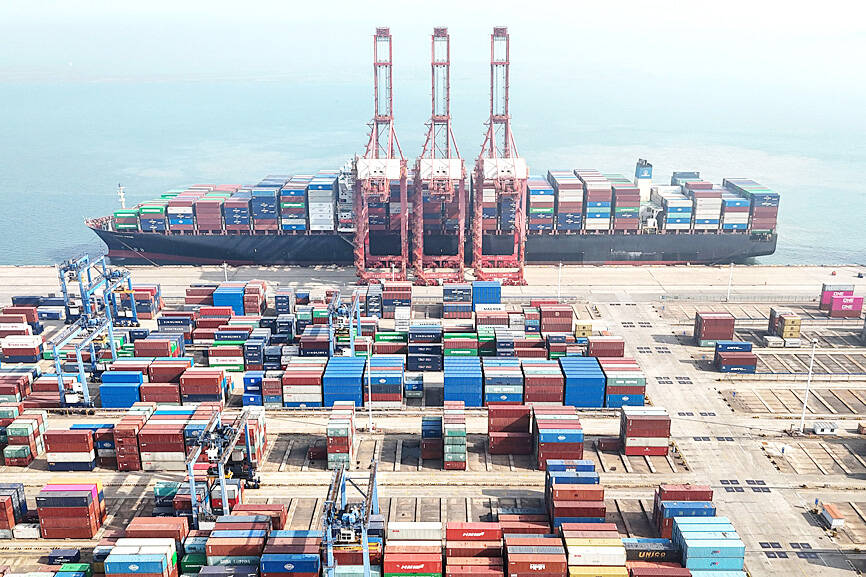China’s exports slumped last month, dealing a blow to hopes that booming sales abroad would offset weak demand at home and drive growth in the world’s second-largest economy.
Exports shrank 7.5 percent in US dollar terms last month from a year earlier, while imports fell 1.9 percent, the Chinese General Administration of Customs said yesterday.
Both numbers came in well below economists’ forecasts. The trade surplus for the month was almost US$59 billion.

Photo: AFP
Bright spots in earlier data, especially from trade and industry, had offered encouragement that China’s goal this year of about 5 percent economic growth was within reach.
Manufacturing companies reported an expansion for the first time since September and new export orders also picked up after contracting for months. Banks including Goldman Sachs and Morgan Stanley raised their annual growth forecasts this week.
“Taking the positive surprise seen earlier this year, we still view that exports should be on a recovering trend, but modestly,” Societe Generale SA Greater China economist Michelle Lam (林雪潔) said. “The data may also lead to some less aggressive expectations for first-quarter GDP out next week.”
That number is due out on Tuesday, along with a raft of other data from retail sales to industrial output that would offer a clearer picture of the outlook.
Expectations that China would rely on demand in other nations to meet growth targets have helped stoke trade tensions with the US and Europe.
Those are not likely to fade even after last month’s slowdown because in some contentious areas China’s foreign sales are still advancing.
Exports of steel products rose 31 percent in the first three months of the year, the most since 2016. Back then, the EU, the US and Japan complained about Chinese steel overcapacity driving down global prices — concerns that have resurfaced in the past year.
In manufactured goods including vehicles and semiconductors — two areas where Western nations are trying to fend off Chinese competition — exports recorded double-digit percentage growth in US dollar terms in the first three months of the year.
Phone sales declined, but the actual number of phones shipped overseas rose 6.3 percent, illustrating how Chinese firms are slashing prices.
Generally, last month’s data need to be set in context of the previous two months, and quarterly data offer a more reliable guide, Pinpoint Asset Management (保銀私募基金管理) president Zhang Zhiwei (張智威) said.
On that basis exports rose 1.5 percent year-on-year, compared with a fourth-quarter contraction, which “shows a reasonable story about external demand,” Zhang said.
Other Asian nations have benefited from signs of improving international demand, with sales to the US and elsewhere driving a continued expansion in Taiwanese and South Korean exports last month.

CAUTIOUS RECOVERY: While the manufacturing sector returned to growth amid the US-China trade truce, firms remain wary as uncertainty clouds the outlook, the CIER said The local manufacturing sector returned to expansion last month, as the official purchasing managers’ index (PMI) rose 2.1 points to 51.0, driven by a temporary easing in US-China trade tensions, the Chung-Hua Institution for Economic Research (CIER, 中華經濟研究院) said yesterday. The PMI gauges the health of the manufacturing industry, with readings above 50 indicating expansion and those below 50 signaling contraction. “Firms are not as pessimistic as they were in April, but they remain far from optimistic,” CIER president Lien Hsien-ming (連賢明) said at a news conference. The full impact of US tariff decisions is unlikely to become clear until later this month

GROWING CONCERN: Some senior Trump administration officials opposed the UAE expansion over fears that another TSMC project could jeopardize its US investment Taiwan Semiconductor Manufacturing Co (TSMC, 台積電) is evaluating building an advanced production facility in the United Arab Emirates (UAE) and has discussed the possibility with officials in US President Donald Trump’s administration, people familiar with the matter said, in a potentially major bet on the Middle East that would only come to fruition with Washington’s approval. The company has had multiple meetings in the past few months with US Special Envoy to the Middle East Steve Witkoff and officials from MGX, an influential investment vehicle overseen by the UAE president’s brother, the people said. The conversations are a continuation of talks that

CHIP DUTIES: TSMC said it voiced its concerns to Washington about tariffs, telling the US commerce department that it wants ‘fair treatment’ to protect its competitiveness Taiwan Semiconductor Manufacturing Co (TSMC, 台積電) yesterday reiterated robust business prospects for this year as strong artificial intelligence (AI) chip demand from Nvidia Corp and other customers would absorb the impacts of US tariffs. “The impact of tariffs would be indirect, as the custom tax is the importers’ responsibility, not the exporters,” TSMC chairman and chief executive officer C.C. Wei (魏哲家) said at the chipmaker’s annual shareholders’ meeting in Hsinchu City. TSMC’s business could be affected if people become reluctant to buy electronics due to inflated prices, Wei said. In addition, the chipmaker has voiced its concern to the US Department of Commerce

STILL LOADED: Last year’s richest person, Quanta Computer Inc chairman Barry Lam, dropped to second place despite an 8 percent increase in his wealth to US$12.6 billion Staff writer, with CNA Daniel Tsai (蔡明忠) and Richard Tsai (蔡明興), the brothers who run Fubon Group (富邦集團), topped the Forbes list of Taiwan’s 50 richest people this year, released on Wednesday in New York. The magazine said that a stronger New Taiwan dollar pushed the combined wealth of Taiwan’s 50 richest people up 13 percent, from US$174 billion to US$197 billion, with 36 of the people on the list seeing their wealth increase. That came as Taiwan’s economy grew 4.6 percent last year, its fastest pace in three years, driven by the strong performance of the semiconductor industry, the magazine said. The Tsai